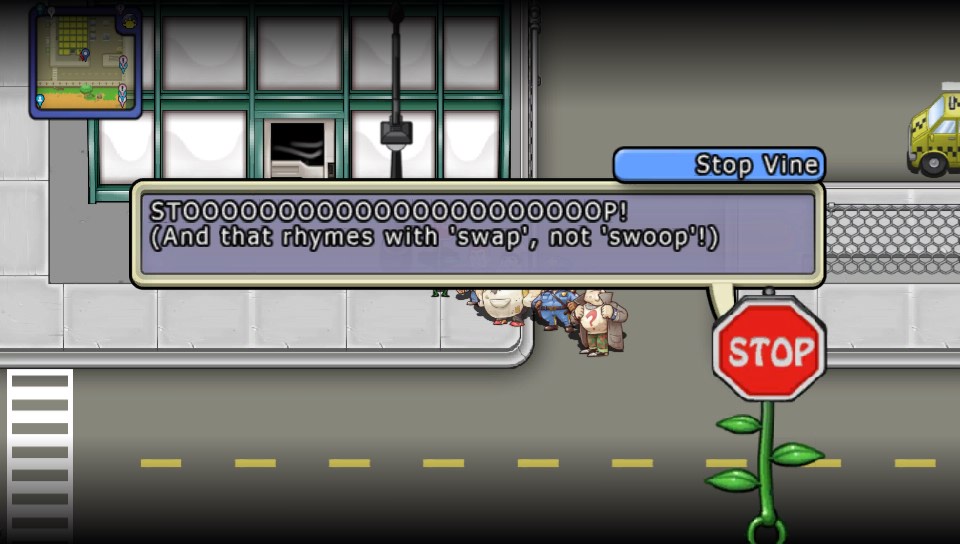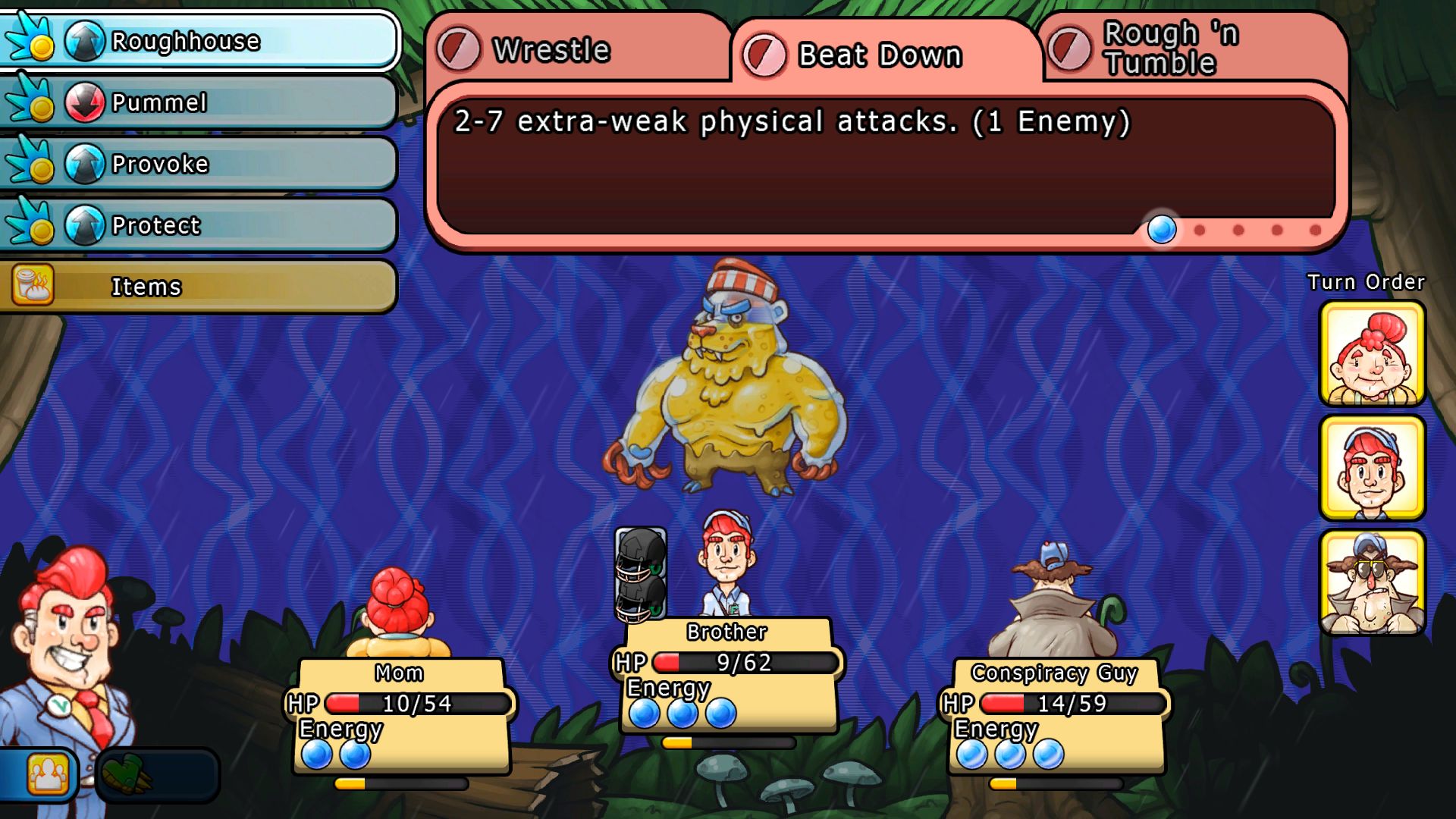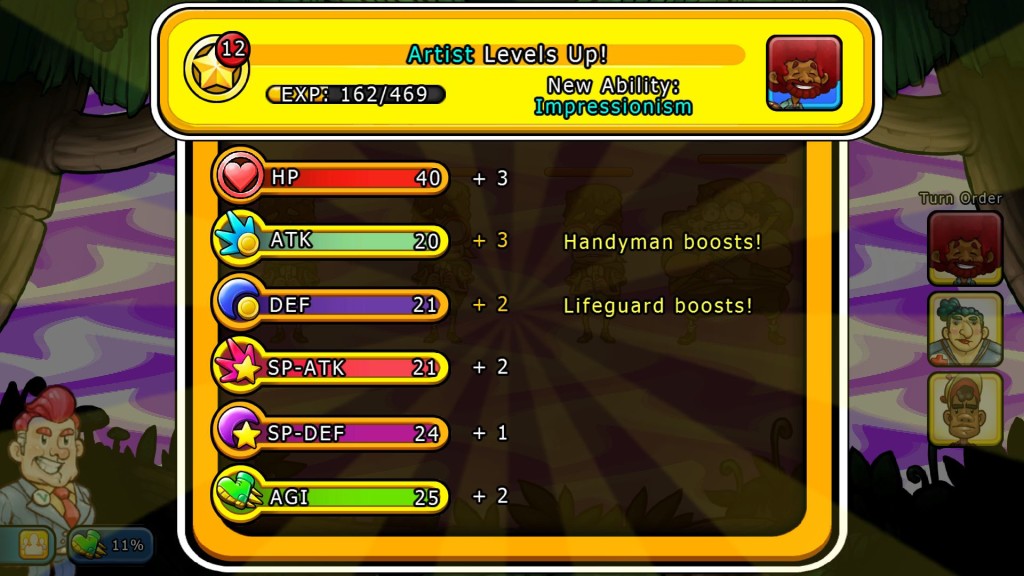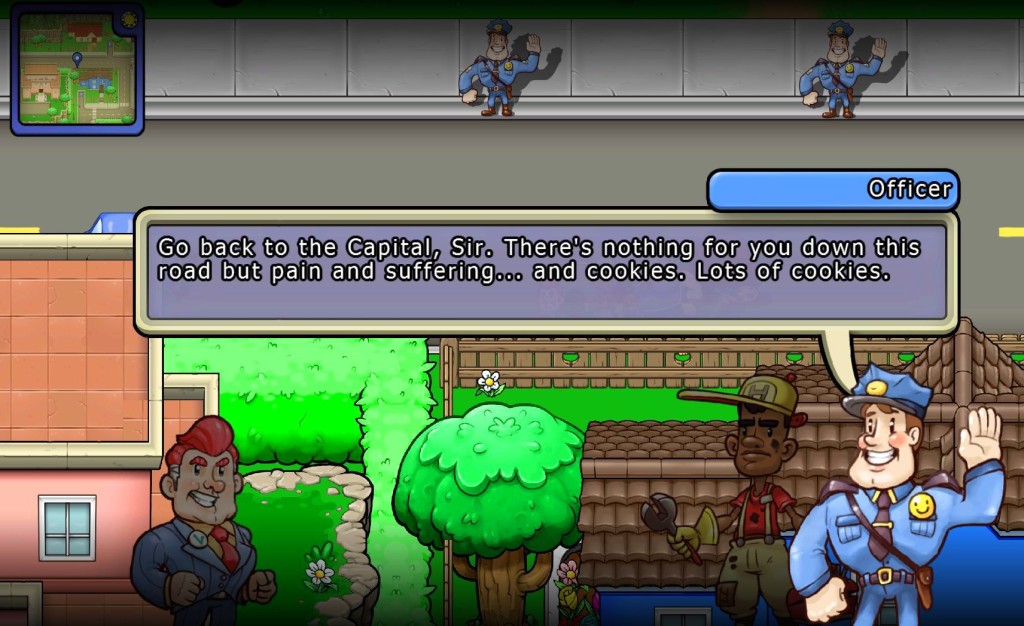(Ed: This post isn’t by Gareth Newnham but a good frined of the Lemming – Lance French)
I feel that it’s best to lay my personal cards on the table before starting this review, just so you know exactly where i’m coming from. Back in the day, in what I personally consider to be the golden age of gaming (the late 90′s and early 2000′s), I was an avid JRPG junkie, frittering away way too much money on import versions of Lunar: Silver Star Story, Wild Arms 2, Grandia and Arc the Lad. They’re not old-school JRPGs in the way that Final Fantasy VI might be, but they had their various charms, and were fantastic games in their own right. They had that curious blend of quirky, funny and overly dramatic that is just not seen these days.
So when I was told that Eden Industries Citizens of Earth had been picked up by Atlus (after failing to meet the kickstarter funding goals), I was as excited as a kid in a candy sto – the Apple store. Finally, a return to (at least what I consider to be) the good old days! But did it work out that way?
Ehh…..kinda.
From the outset, the player is treated to a nice, plodding – and slightly off-key – version of Hail to the Chief. It’s a great opener. It’s witty, it’s charming and it gives the game a certain low-budget feel that engenders affection in the player. So far, so good.
And so, to the meat of the thing. Citizens of Earth follows the adventures of the Vice President as he strives to uncover a (downright strange) plot involving aliens, conspiracies and coffee franchises. As a character, he really shines. Despite his high status, he’s not exactly well-liked by the people, treated with disdain by his colleagues and still lives with his Mother. Something for the JRPG fans to relate to there, no doubt. The funny thing is, on paper, he’s a manipulative, amoral and flaky bumbler, but in-game, these traits are actually rather endearing, and he’s subject to a fair bit of character development, too. He doesn’t take part in battles himself, instead standing in the foreground, clear of the fight, commiserating and cheering on the poor saps who do the actual fighting. And who says that video games can’t be satirical?
Party members are gained in a suikoden-esque fashion. There are 40 different citizens to recruit into your line-up, and while some will willingly join you unconditionally, like your mother and your brother, others are a bit more discerning. The various citizens will ask you to complete (mostly) related quests before they offer you their support. For example, the teacher will refuse to join someone who isn’t as mentally-capable as he would like, giving you a fiendish little quiz before throwing in with your crew. The Yoga Instructor wants to see a party of level 20 characters before she joins up, refusing to offer her aid to an inexperienced party. Once they do join you, the characters characters come with a small variety of differently-named yet utterly interchangeable battle abilities. Where they really shine, however, is in their talents. Your brother, who works for a delivery company named FedUPS (chortle) will work a shop, the cop offers bounties of mini-boss characters, while the conspiracy guy takes copious notes, working as your bestiary. As they level, these talents get stronger, and offer more items, more bounties, etc. It’s a brilliant addition to a game that otherwise (unfortunately, like suikoden) would see you use a base party of characters you kind of like, or are suitably powerful, leaving the rest on the bench. Characters level up slightly differently depending on who they’re fighting alongside, too. Tactical genius on behalf of Eden Industries, and thoroughly commendable.
The battle system itself has a fairly standard setup, looking (at first glance) like the simplistic fare of RPG Maker or the older Phantasy Star series of games. Your dudes line up at the bottom, the bad guys line up at the top, and you take turns to smack each other in various ways until one side wins. Battle’s aren’t precisely random, using a similar system to the Tales of series. Enemies occur on the field, and you can choose to run, stand and fight when they come at you, or charge into them. One neat little feature is the charge button. Pressing square will result in the veep sending his units forward, bashing into a battle on purpose. If the enemy is of a low enough level, it grants you an instant win instead of forcing you to sit through a tedious fight (and even more tedious loading screens) with an enemy you can kill in one hit. It’s just one of many novel little inclusions that don’t push the genre forward, but refine it.
The problem with the battle system is in the use of Energy. Each character will get 3 energy slots, which are refilled by using lower-level attacks. Energy is then used to fuel more powerful attacks, which can sometimes require all 3 energy to pull off. Healing, for instance, will require energy, which though it seems nicely strategic on paper, means that certain characters will be completely unable to heal when you want them to, because they need to alternate their powers with weak-ass attacks, wasting entire turns and forcing you to use items instead. It all-too-often ends up in one of two scenarios: Either the player is forced to keep using pitifully-weak attacks on consistently stronger enemies just to ‘save up’ enough to use their actually-useful abilities or you’ll find yourself wasting time, getting into easy fights just so you can stock up on energy (which thankfully carries over) and take on harder prey. It’s an unfortunate turd in the otherwise competent stew of Citizens of Earth‘s battle system. You can’t even eat around it. It WILL plop onto your spoon. Also, the battle BGM is dire. It might seem like a petty criticism, but for music that we will be forced to listen to every single time we get into a scrap, a slightly trancey lullaby with a painfully-dull metronome in the background is NOT the most exciting of choices. After a while, I was groaning with pavlovian dread in anticipation of that horrible fucking music. Not since Koudelka have I felt this way, and I wonder why they didn’t use a sped-up version of their opening music, or Nyan Cat, or basically ANYTHING other than this.
A lot of the time, with a JRPG, it comes down to the humour and the charm of the game. Disgaea and Makai Kingdom would have been a lot poorer if it weren’t for the fact they didn’t take themselves too seriously. The Lunar series was unremarkable until Working Designs‘ genuinely funny reworking. From the very start, Citizens of Earth seems to follow this tradition, offering up some truly laugh-out-loud lines, delivered by a voice acting job that is among the best I have ever encountered. The characters sound genuine, with a real sense of expression, and the stellar voice work makes for a spot-on delivery of some of the more humourous lines. The problem, however, is that where we could forgive a game like Disgaea the occasional cheap pun or nonsensical line, putting it down to problems with localisation between the Japanese and English versions and the two different cultures the game needs to straddle, we can’t do that here. It was produced in Canada. Japanese humour is very pun-heavy, and stuff like this could be tolerated with little more than an eye-roll and a winsome smile at cultural difference:

But here, we are left to assume that the game was constructed to emulate as much as possible the things that we tolerated as an unfortunate necessity back in the day. Wild Arms 2 had a shockingly-bad English translation, but we suffered it because it was a translation. Some of the lines in Citizens of Earth manage to show the same signs, even without the excuse of originating in another language and culture. When voice acting in battles was fairly new, we all tolerated the same old soundbites from out characters, dramatically elongating the word ‘slash’, and crying out the names of their attacks when they made them. It was annoying as fuck, but we dealt with it. Now that in-game voice acting isn’t quite so new (ie. being basically the standard), it’s a lot more irritating to listen to a baker cry ACH DU LIEBER every time he gets hit.
Despite this disappointment, there is certainly enough to like about Citizens of Earth. There are a lot of novel little additions, from the ability to change difficulty mid-play, taking higher risks for higher rewards or making it easier on yourself for less plunder. The school allows characters to be trained while they’re not in your party, and party members receive exp even while they’re downed. You can even jiggle the stats of your characters to make for a far more fleshed-out experience. Still, there is also a lot to get annoyed about. Loading screens are everywhere, every time you enter a house, or leave one, and it really breaks up the game, making it feel like a strangely-disjointed affair. Enemies are hard to avoid due to the conga-line of followers that can be clipped easily from behind, and the humour falls pretty flat after a few hours of playing.
Overall Thoughts?:
Citizens of Earth, therefore, is a strange animal. Its flaws keep it from being a truly great game, or even a truly great JRPG, but there are some really good ideas here. It comes highly recommended to those who know the genre well, and accept it for what it is, but for new players, or anyone that expected an experience free of the problems plagued by the JRPGs of the past, it’s not going to win any favours.



